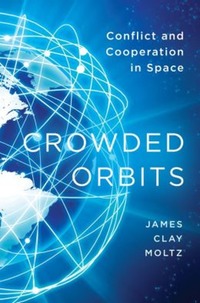Review: Crowded Orbitsby Jeff Foust
|
| Moltz shies away from offering a specific solution to enhancing space security, offering in the book’s final chapter three future scenarios by which it could be achieved: military hegemony, piecemeal global engagement, and enhanced international institutions. |
That situation is well-known in the space community, so much so that it comes up with shorthand devices like “3 C’s.” (And, perhaps, if you’ve really dived deep into the material, you’ll start mentioning things like the “5 D’s” and the “5 P’s,” referring to other alliterative aspects of the policy.) Those shorthands, though, don’t work as well when trying to communicate those concepts to a broader audience, particularly policymakers outside the space field who help shape national and international policy on those topics but have little understand what it means for space to be congested, contested, or competitive.
Stepping in to fill that knowledge gap is Crowded Orbits, a new book by James Clay Moltz, a professor at the Naval Postgraduate School. In a relatively brief volume (less than 200 pages excluding endnotes and index), Moltz provides a summary of the history of and future prospects for space activities, and the potential for international cooperation—or conflict—in space.
Crowded Orbits is geared primarily towards those outside the space field, and much of the book covers familiar ground, with separate chapters providing overviews of civil, commercial, and military space activities by the United States and other nations. He devotes another chapter to space diplomacy activities, providing some useful background even for those already in the space field on some of the current proposals like a space code of conduct (frequently discussed in the pages of this publication), as well as background on why there’s been so little progress on a code or other diplomatic approaches to improving space security, notably a long-running deadlock in the Conference on Disarmament.
Moltz shies away from offering a specific solution to enhancing space security, offering in the book’s final chapter three future scenarios by which it could be achieved: military hegemony, piecemeal global engagement, and enhanced international institutions. However, he argues the first of those scenarios is unlikely given the expense involved in establishing such hegemony, while the second may not be sufficient as the number of government and commercial players in space activities grows. The last option may offer the most robust solution, but it’s also not an easy one given the lack of progress in space diplomacy in recent years. One approach Moltz suggests is to start with a voluntary code of conduct and use it to identify areas of concern that would benefit from more explicit, legally-binding agreements.
Those who read Crowded Orbits without already being familiar with the state of space diplomacy will come away from this book with at least two key lessons: the need for greater cooperation and coordination in space given the growing number of users of space and the importance of their activities, and the challenges in creating that cooperation and coordination, based on the limited success in recent decades. “In today’s multinational space environment,” he writes at the end of the book, “there has too often been a tendency to think that improving security in space is somebody else’s job and that things will ‘work themselves out’ if they are simply left alone. This is wishful thinking.” As space becomes more congested, contested, and competitive, that is advice that needs to get beyond the small space policy community and to a broader audience, which this books helps accomplish.
